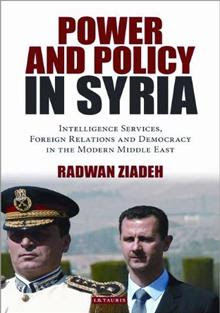
Hussain Abdul-Hussain
The Majalla
In "Power and Policy in Syria," Radwan Ziadeh captures the essence of Syria's domestic, political and socio-economic scene better than any other book on the subject. In five chapters, this brief manuscript takes readers on a quick tour that covers a bit of history, some domestic politics, Syria's foreign policy and a concluding chapter on the nation's Islamist movement.
Radwan Ziadeh argues in his new book that Syria's current state of affairs can be traced back to what he calls the Third Republic, which started with the Baath Party coup of 1963. According to Ziadeh, the First Republic extended between the country's independence from the French in 1946 and the union with Egypt in 1958. The Second Republic lasted until the union broke down in 1963, when a radical wing of the Baath Party under Salah Jdid took over. In 1970, the party's military wing under Hafez Al-Assad executed the last of a series of coups that riddle Syria's history. Assad took control of the country.
Ziadeh believes that Assad was hesitant at first. While effectively the ruler of Syria, he planned to stay prime minister and appoint a puppet president. Because the constitution stipulated that the country's president should be Muslim, and because Assad was Alawite, he first passed on the idea of becoming president but later changed his mind when his protege, Iranian-born Lebanese Shiite cleric Mussa Sadr, issued a verdict resolving that Alawites were Muslims.
Once president, Assad consolidated his power by building a three-legged pyramid with him at its top and with prerogatives that made of him an undisputed autocrat. Assad realized his lack of constitutional legitimacy, so he turned to "revolutionary legitimacy." In 1973, he went to war with Israel "to liberate the Golan Heights, but he could only 'regain' Al-Qunaytirah." After the war, Assad received big money from oil-rich Arab countries. Together with Syria's oil-revenues, he lavishly spent on his extensive security system. Ziadeh calculates that today, there is one secret police operative for every 256 Syrians.
Oblivious to domestic and economic issues, Assad focused his energy on foreign affairs, invading Lebanon in 1976 and siding with the United States in ejecting Saddam Hussein's Iraqi troops from Kuwait in 1991, after which Assad was rewarded and a "honeymoon" in relations with Washington ensued and lasted until 2001.
Assad died in 2000. Before his death, he made sure to improve relations with all of Syria's neighbors. By the time his son Bashar had taken over, Syria was living in a more relaxed political atmosphere that came to be known as the Damascus Spring. Ziadeh was active in the debate that took place inside Syria at the time.
The Damascus Spring, however, proved to be short-lived. "The Average age of the country's politicians was in excess of 60 years and almost all of them had risen through the ranks of the Baath Party. Most of them had no academic qualifications or educational expertise and, furthermore, few had been given the opportunity to travel or to observe administrative, technical, scientific, political and social developments in the West," Ziadeh wrote. "For this reason, the country's leaders often had negative views of the projects introduced during the first two years of Bashar Assad's rule,??? he added.
Ziadeh also wrote that there was "a sense in which the Syrian regime under the 'eternal leader'? Hafez Assad (as the official media called him) had been faultless, therefore, Bashar Assad has repeatedly refused to talk about 'reform' and has always answered his critics by saying the terms we use in Syria are development and modernization."
But Ziadeh's perspective on a few foreign policy issues does not seem as informed as his knowledge of Syria's internal situation. He wrote that Lebanon's Hezbollah had scored a limited victory against Israel in 2006, "brought about by courageous defense and killing a large number of Israeli soldiers on the battlefield," and that the so-called victory "gave huge support to the Syrian position and enabled it to consider the option of resistance at a suitable opportunity in the Golan area." He does not reason, however, why in 2011, the "Syrian position" was still considering this "option of resistance" in the Golan area.
Despite the book's shortcomings on Syria's foreign policy, Ziadeh correctly concludes that Damascus should in the future forget its foreign policy ambitions and focus instead on its domestic affairs. This Ziadeh calls "strategic withdrawal" or "strategic retraction."
Ziadeh deserves all the credit for this book. His publishers IB Tauris, however, have done a lousy job. At a price of around $75, the book is riddled with language and factual mistakes. The manuscript seems to be a first draft that went to print without copy-editing. Errors include wrong names, such as "Major General Imad Aoun" (instead of Michel Aoun the Lebanese lawmakers), and assigning the date of the "Hezbollah armed attack on Beirut" as "23 March, 2008" instead of 7 May, 2008.
Also according to this book, the Beirut Arab Peace Initiative with Israel was originally a Syrian idea before it was proposed by Saudi Arabia in 2002. In fact, Saudi Arabia was the first to float the idea at the Morocco Arab Summit in 1981, when it came to be known as the Eight-Point Peace Plan or the Fez Initiative. Other errors are as simple as considering that the United Arab Republic consisted of two regions, "Egypt (North) and Syria (South)." A look at the map would simply show that Syria is to the north of Egypt.
Source: http://hussainabdulhussain.blogspot.com/2011/05/book-review-power-and-policy-in-syria.html
thor reviews colt kareem abdul jabbar no pants day tupelo thalassemia rob lowe
No comments:
Post a Comment
Note: Only a member of this blog may post a comment.